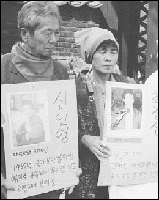|
|
|
監督・脚本・撮影・編集:キム・テイル(金兌鎰)
Director, Script, Photography, Editing : Kim Tae-il |
1963年生まれ。韓国在住。91年のインディペンデント・フィルム・ワークショップをきっかけに映画製作を始める。代表作は『People Who Overcame the Division』(95年)、『お母さんの紫色のスカーフ』(95年)、『Aging Grass Stays Greener When Together』(96年)など。朝鮮半島の分裂と、38度線によって政治や生活の面で隔てられた人々をテーマにした作品を発表してきた。現在は、再統一、労働、売春、環境などの社会問題に意欲的に取り組むインディペンデントの映画会社、プルン・プロダクションでプロデューサーとして活動している。 Born in 1963. Currently lives in Korea. He started filmmaking through Independent Film Workshop in 1991 and directed several films including People Who Overcame the Division (95), A Mother's Purple Handkerchief (95), and Aging Grass Stays Greener When Together (96). His work focuses on the division of the Korean peninsula and the political and personal ramifications of the 38th parallel. He is currently working as a producer at Purn Production, an independent film company that tackles issues like re-unification, labor, prostitution, and environment. |
 |
|
| 題名は、長年政治犯として投獄されている囚人の母親たちが毎週ごとの抗議デモでかぶるスカーフを指す。40年ぶりに出獄できた男が90歳をすぎた母親と再会する映像は、どんな政治スローガンより雄弁かもしれない。 | The title refers to the purple scarf worn by mothers of long-term prisoners of conscience in their weekly demonstrations in Seoul. No political slogans carry the same weight as footage of the reunion of a man with his mother after over 40 years in prison. |
|
|
|
|
監督のことば 私はこの作品を通じて、韓国社会の人権問題を提起したかった。植民地からの解放から国家分断まで、激動の現代史は、今でもわれわれの人生を規定している。分断がもたらした苦痛は、その原因や背景とは関係なく、現実的に反共を国是としているわれわれにとって、避けることのできない障壁であり、克服しなければならない対象でもある。 われわれは、良心犯(自分の思想、信念に基づいて行動し罪人となった人)の問題に敏感にならざるをえない。基本的人権として保障された良心の自由が、分断の構造によって全く保障されていないのが現実である。この作品は、良心犯のなかでも、長期刑を言い渡され、監獄で7年以上にわたって生活している良心犯に関する物語であり、わが子を監獄に奪われた母親に関する物語である。現代史において、最も思い苦痛を抱きながら生きてきたのは、たぶん母親たちであろう。わが子を監獄におくらなければならない苦しみをどこにも訴えることができない母親たちは、社会の熱い視線を胸に受けとめながら生きてきた。 そんな人たちの人生をドキュメンタリーという形で描いてみたが、彼らの痛みを形象化するのは非常に難しかった。分断という壁に阻まれて、十分に表現できない部分がかなりたくさんあった。 現在でもタプコル公園の前で紫色のスカーフを頭に巻き、良心犯の釈放と国家保安法撤廃のために闘っている民主化実践家族運動協議会のお母さんたちにこの作品を捧げたい。 |
Director's Statement Through this film I wanted to raise the question of human rights in Korean society. Our lives are still ruled by the turmoil of contemporary history from the colonial liberation from Japan to the division of the country. The unavoidable wall created by the reality of our national anticommunism must be overcome. It is not related to the pain brought about by the cause and context of the division. We cannot help but become more sensitive to the problem of our political prisoners. The reality of the structure of a divided nation prohibits freedom of thought being guaranteed as a fundamental right. This film covers over seven years of the lives of political prisoners who have been handed down long sentences. It is also a film about the mothers of these prisoners whose children have been stolen from them. In the course of contemporary history perhaps the mothers who have suffered the deepest pain, the pain of not being able to challenge the sending of their own children to jail. They have lived with the harsh gaze of society heavy upon their chests. I tried to describe these people's lives in the form of a documentary but it was difficult to visualize their pain. With the wall of division still in place, there were many things that could not be fully expressed. I would like to dedicate this work to the mothers of the Family Movement Association for Democratic Practice who today, in Pagoda Park with purple scarves wrapped around their heads, are still fighting for the abolition of the national security law and the release of political prisoners. |
